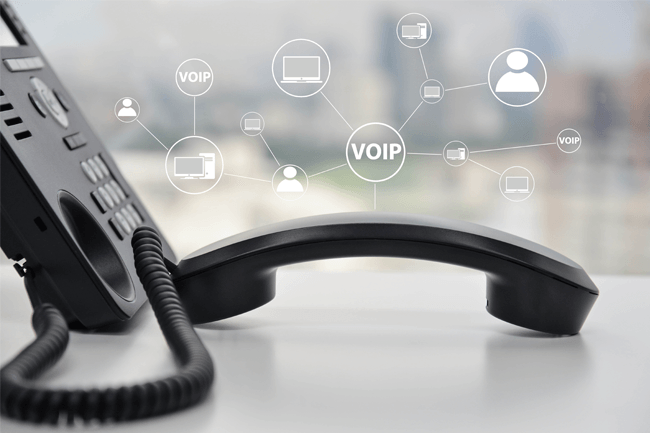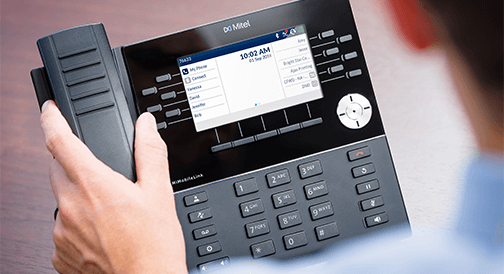
BUSINESS PHONES | 4.5 MIN READ
Workplace innovation just in the 21st century provide ample evidence that "the only constant is change." We've gone from file cabinets and fax machines to file serves and e-mail. Our desk space was once gobbled up by desktop monitors almost as big as moving boxes, and phone calls used to go only as far as either the cord or the antenna allowed.
One amazing innovation companies are very much warming to actually involves those business phone systems. The shorthand is "VoIP."
VoIP (voice over internet protocol) phone systems are an innovation businesses may consider when looking to upgrade their current phone plan, but what is VoIP exactly?
Not enough time? Jump to:
Other Types of Business Phone Systems
What is VoIP?
VoIP, which stands for Voice-over-Internet-Protocol, is the means in which calls are routed over the internet as opposed to traditional landlines. VoIP is used in conjunction with on-premise and hosted phone systems.
Internet Protocol (IP)-based telephony allows for voice and data to be transmitted at a much lower cost than through traditional phone lines. As more business processes move online, companies both big and small are beginning to adopt VoIP-style phone systems into their offices.
There are two main types of VoIP phone systems: on-premise (also known as self-hosted) and hosted (also known as cloud-based). On-premise systems are suited for large businesses or those who want to still use their legacy Private Branch Exchange (PBX) system., seeing as on-premise systems can be expensive to maintain.
Hosted VoIP phone systems utilizes cloud-based infrastructure, minimizing maintenance costs you would otherwise have with on-premise systems.
How Do VoIP Phone Systems Work?
VoIP phone systems work by converting your voice into Internet Protocol (IP), allowing you to make a call directly from a computer, a VoIP phone, or other data-driven devices.
An Internet connection is required to connect to and use a VoIP system. While some VoIP systems only work using a computer or VoIP phone, other systems let you use traditional analog phones that are connected to a VoIP adapter. However, if you use a computer to make calls, you'll likely need some sort of software.
Pros and Cons of VoIP Phone Systems

Pros
- Minimal hardware installations− Since hosted VoIP systems are cloud-based, little hardware will have to be set up at your office, which can save money, office space, and time.
- Call quality - With advancements in technology, high definition codecs have enhanced voice quality well beyond landline abilities.
- Advanced features - VoIP offers all the features you get with standard phone service, like call waiting, holding, conferencing, transferring calls and caller I.D. Because calls are digitized, though, recording a call is a breeze. Video conferencing integration is an added feature businesses should consider, too, and some providers even offer advanced service options like chat and email.
- Remote office enablement− VoIP phone systems enable employees to make calls from a variety of devices besides traditional handsets. This gives remote employees the flexibility to conduct business how they need.
- Scalability− With VoIP phone systems, it's easy to add and remove users no matter where they are located, making it easy to scale up the size of a remote office's phone system.
- Flexibility− VoIP users can make business calls from most devices that have an Internet connection, such as tablets and computers. This means that users have the flexibility to conduct business how they see fit.
- Low-cost calling− End users can typically make free or cheap international and long distance calls, saving businesses that conduct international business money.
- Cheap− Smaller installation and maintenance costs mean that VoIP systems can quickly produce a ROI.
- Unified Communications (UC)− Many modern VoIP systems offer some form of Unified Communications, which seamlessly integrates and consolidates multiple communication methods such as calling, email, and text into one place, thus streamlining business processes.
Cons
- Downtime− If you experience Internet problems or power outages, your VoIP system may go down. Additionally, if your Internet connection is weak, call quality can be impacted. Because of this, businesses that employ a VoIP system must make a strong Internet connection a top priority.
- Emergency calling− VoIP systems are not guaranteed to support emergency call services to numbers such as 911. Since VoIP calls can't be easily traced to a geographical location, it can be hard for emergency responders to identify a VoIP caller's location.
- Security− Just like any other Internet-based application, VoIP systems can be vulnerable to cyber threats such as malware and Denial of Service (DoS). However, the right provider will know how to effectively outfit your system with the proper security settings and tools.
- IT Staff Involvement− Since VoIP systems are Internet-based, your IT staff will need to be involved in some capacity to get it running and solve any issues that pop up.
RELATED: How to Buy a Business Phone System
Other Types of Business Phone Systems
Plain Old Telephone System (POTS)
POTS are what most people imagine when they picture a phone system. They are a traditional analog phone service that incorporates and connects private phone lines to a network through a traditional landline.
These types of systems haven't changed much in the past century, and are what you would typically get using a major provider like AT&T. Telephone companies like Verizon connect calls using the Publicly Switched Telephone Network (PTSN).
The PSTN makes it possible for a Verizon customer to call an AT&T customer as well as patching calls over locally. However, it is not recommended to deploy these types of systems because they are increasingly becoming outdated and therefore expensive to maintain.
Traditional Private Branch Exchange (PBX)
PBX systems are an on-premise phone solution that lets businesses customize their physical infrastructure as they see fit. Many large businesses employ traditional PBX systems so they can more closely control their infrastructure.
While PBX phone systems have reliable call quality, even in places without high-speed Internet, and also allow businesses to own their hardware, they are expensive to set up and maintain.
RELATED: On-Premise vs. Hosted Phone Systems- Which is Better?
Who is a Good Fit for a VoIP Phone System?

Remote Businesses
While businesses that are fully remote may benefit from each employee using a traditional landline phone or personal smartphone, VoIP systems are basically unrivaled for the scalability and flexibility that they offer to remote offices.
Since VoIP systems can be quickly scaled up or down, remote employees can be easily added or removed. Additionally, since VoIP systems let employees take calls from devices other than traditional business phones, this gives employees the flexibility to work where and how they wish without being tied to a traditional desk phone plugged into the wall.
RELATED: 3 Steps to Set Up a Remote Office
Customer Service Industry
Businesses in the customer service industry or those with a large call volume could benefit from a VoIP phone system. These systems come with features that can streamline call centers and boost productivity.
Businesses can also more cheaply outfit their call centers by installing VoIP phone systems, especially if their employees are remote.
Businesses Experiencing Rapid Expansion
Companies experiencing rapid expansion, for instance those hiring many new employees or opening new offices, would benefit from the scalability that comes with VoIP phone systems.
Since these systems can be quickly set up and users can easily be added, businesses could expand and shrink their system to meet demand more easily then they could using a traditional phone system.
Does Your Business Need VoIP?
“What we have works” is a common refrain when innovation arrives at management’s desk. No judgement here! When the cost to embrace innovation becomes a deterrent, it’s easy to understand why that reaction surfaces.
In the case of VoIP, however, savvy business leaders are not only embracing VoIP in growing numbers, their bottom lines benefit. Also, in an era where employees are more mobile and "work from home" is more than just a passing fancy, VoIP provides affordable flexibility and solutions that didn't always exist.
RELATED: VoIP vs Landline For Business: Which Is Better?
If you've determined that a VoIP phone system may be the right fit for your business, consider us! As an Atlanta-based VoIP provider, our high-quality products and market-leading customer service ensure satisfaction.
For more business phone and office technology content, follow our blog!
Posted by Andre Schafer

Andre Schafer is a Technical Account Manager at Standard Office Systems. He has spent his entire career in the Office Technology and IT fields. For nearly 30 years, he has held various roles, including Technician, Trainer, Analyst, and Account Manager. Andre’s focus has always been to understand his customers' business needs to provide the appropriate technologies and services.


